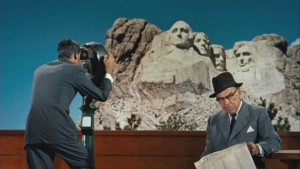In today’s Wall Street Journal drama column I review a Boston revival of Moss Hart’s Light Up the Sky and an off-Broadway remount of Annie Baker’s The Flick. Here’s an excerpt.
* * *
Moss Hart is so well remembered for his collaborations—he wrote comedies with George S. Kaufman and musicals with Irving Berlin, Ira Gershwin, Cole Porter, Rodgers and Hart and Kurt Weill—that few now recall his rare solo efforts. Yet Hart also wrote four plays of his own that got to Broadway, one of which, “Light Up the Sky,” was a medium-size hit that opened in 1948 and ran for 214 performances. While it hasn’t been seen in New York for a quarter-century, “Light Up the Sky” continues to be performed regionally, and it’s being done twice this year, first by Boston’s Lyric Stage Company and later on at Ontario’s Shaw Festival. Curious to see how it held up, I checked out the Boston version and found it to be fluffy, funny, and performed with limitless panache by a choice ensemble cast whose nimble members never let a punch line go unpunched….
 “Light Up the Sky” is a backstage farce about the Boston tryout (a neat coincidence!) of a way-too-earnest play called “The Time Is Now” whose cast, production team and naïve young author (Alejandro Simoes) are all in blissful ignorance of what will presumably be their fast-approaching doom….
“Light Up the Sky” is a backstage farce about the Boston tryout (a neat coincidence!) of a way-too-earnest play called “The Time Is Now” whose cast, production team and naïve young author (Alejandro Simoes) are all in blissful ignorance of what will presumably be their fast-approaching doom….
A play full of plum parts demands canny and calculated staging, and Scott Edmiston, the director, makes trebly sure that nobody steps on anybody else’s laughs. The members of his cast, most of them Lyric Stage veterans, are gloriously good…
The original production of “The Flick,” Annie Baker’s Pulitzer-winning play about a grubby single-screen Massachusetts movie house and its sad-sack staff, is now being remounted at Barrow Street Theatre after a 2013 off-Broadway run at Playwrights Horizons. It’s a melancholy Kenneth Lonergan-style comedy in which Ms. Baker dramatizes the discontents of three young-to-youngish losers (exquisitely well played by Louisa Krause, Matthew Maher and Aaron Clifton Moten) who can’t figure out how to make their way in a success-oriented world and fear, with good reason, that “it’s never gonna get better.” So far, so good, but Ms. Baker has taken what should have been a delicate little play and blown it up to three hours and 15 minutes by inserting portentous pauses (their exact timing is painstakingly specified in the script) that illustrate her characters’ mutual alienation, and Sam Gold, the director, has aided and abetted her by throttling the tempo down to a glacial crawl….
* * *
To read my review of Light Up the Sky, go here.
To read my review of The Flick, go here.
The trailer for Light Up the Sky:
Louisa Krause talks about The Flick:


 “The Frame,”
“The Frame,” 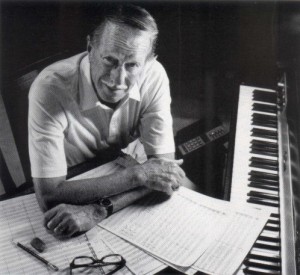 Whenever you write a book or play in which a famous person of the relatively recent past is portrayed, it’s more than likely that you’ll sooner or later meet somebody who knew the person in question and is eager to tell you what they thought of what you wrote. I’m used to that by now, but I admit to having been a bit unnerved—more than a little bit, truth to tell—by the West Coast premiere of Satchmo at the Waldorf, my play about the relationship between Louis Armstrong and Joe Glaser, his manager. No sooner did I take my seat last night at Beverly Hills’ Wallis Annenberg Center for the Performing Arts than I realized that I was sitting in the midst of people who had known Armstrong and Glaser. What’s more, I was introduced after the show to
Whenever you write a book or play in which a famous person of the relatively recent past is portrayed, it’s more than likely that you’ll sooner or later meet somebody who knew the person in question and is eager to tell you what they thought of what you wrote. I’m used to that by now, but I admit to having been a bit unnerved—more than a little bit, truth to tell—by the West Coast premiere of Satchmo at the Waldorf, my play about the relationship between Louis Armstrong and Joe Glaser, his manager. No sooner did I take my seat last night at Beverly Hills’ Wallis Annenberg Center for the Performing Arts than I realized that I was sitting in the midst of people who had known Armstrong and Glaser. What’s more, I was introduced after the show to 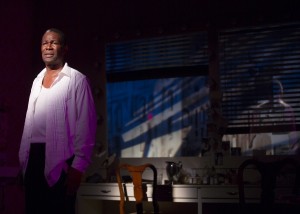 With two performances of Satchmo under our belts, I can report that Gordon’s staging of the play is in excellent shape after the eleven-month layoff that followed the end of the off-Broadway run. If anything, John’s interpretation of the triple role of Armstrong, Glaser, and Miles Davis has actually grown in richness and subtlety since then. It’s strange to think that he’s appeared in highly acclaimed revivals of Eugene O’Neill’s The Iceman Cometh and Christopher Marlowe’s Tamburlaine in between productions of Satchmo. I’m keeping fast company these days.
With two performances of Satchmo under our belts, I can report that Gordon’s staging of the play is in excellent shape after the eleven-month layoff that followed the end of the off-Broadway run. If anything, John’s interpretation of the triple role of Armstrong, Glaser, and Miles Davis has actually grown in richness and subtlety since then. It’s strange to think that he’s appeared in highly acclaimed revivals of Eugene O’Neill’s The Iceman Cometh and Christopher Marlowe’s Tamburlaine in between productions of Satchmo. I’m keeping fast company these days. CLOSING SOON OFF BROADWAY:
CLOSING SOON OFF BROADWAY: I flew out to Los Angeles yesterday morning for Tuesday’s sold-out preview of Satchmo at the Waldorf, which officially opens tonight at Beverly Hills’ Wallis Annenberg Center for the Performing Arts. We rehearsed in the afternoon, and when we were finished, Gordon Edelstein, John Douglas Thompson, and I tried to figure out how many performances John had given to date of Satchmo. Since he’s done it in Lenox, New Haven, Philadelphia, and New York, where Satchmo ran off Broadway for eighteen previews and 136 performances, our best guess is somewhere around three hundred times.
I flew out to Los Angeles yesterday morning for Tuesday’s sold-out preview of Satchmo at the Waldorf, which officially opens tonight at Beverly Hills’ Wallis Annenberg Center for the Performing Arts. We rehearsed in the afternoon, and when we were finished, Gordon Edelstein, John Douglas Thompson, and I tried to figure out how many performances John had given to date of Satchmo. Since he’s done it in Lenox, New Haven, Philadelphia, and New York, where Satchmo ran off Broadway for eighteen previews and 136 performances, our best guess is somewhere around three hundred times. This is, by the way, the first time that I’ve seen Satchmo at the Waldorf, as well as the first time that I’ve taken part in a theatrical rehearsal of any kind, since the show closed off Broadway a year ago. Yet mere seconds after I walked into the theater, I felt as if I’d never been away, and I was as fascinated by the audience’s response to the play as I was when it was premiered by Dennis Neal in Orlando in 2011. The first nighters in Beverly Hills were quiet but attentive, bearing out something that hit me four years ago: some audiences experience Satchmo as a serious play with funny moments, others as a comedy that turns serious at the end. What’s more, I can always tell within a half-minute of the start of the show which kind of audience is in the theater—though not a second sooner.
This is, by the way, the first time that I’ve seen Satchmo at the Waldorf, as well as the first time that I’ve taken part in a theatrical rehearsal of any kind, since the show closed off Broadway a year ago. Yet mere seconds after I walked into the theater, I felt as if I’d never been away, and I was as fascinated by the audience’s response to the play as I was when it was premiered by Dennis Neal in Orlando in 2011. The first nighters in Beverly Hills were quiet but attentive, bearing out something that hit me four years ago: some audiences experience Satchmo as a serious play with funny moments, others as a comedy that turns serious at the end. What’s more, I can always tell within a half-minute of the start of the show which kind of audience is in the theater—though not a second sooner. 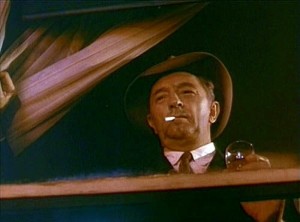 I still feel the same way, though I’d forgotten how completely alien Los Angeles seems to me—like another planet, really. You drive through a scruffy residential neighborhood, then suddenly there’s a movie studio on your immediate right. Alas, I won’t be here long enough to savor the strangeness, or even to see any of my friends. All I have time to do is rehearse the show, attend three performances, and make a couple of Satchmo-related appearances, after which I head straight back to New York to resume my day job, which always awaits me.
I still feel the same way, though I’d forgotten how completely alien Los Angeles seems to me—like another planet, really. You drive through a scruffy residential neighborhood, then suddenly there’s a movie studio on your immediate right. Alas, I won’t be here long enough to savor the strangeness, or even to see any of my friends. All I have time to do is rehearse the show, attend three performances, and make a couple of Satchmo-related appearances, after which I head straight back to New York to resume my day job, which always awaits me.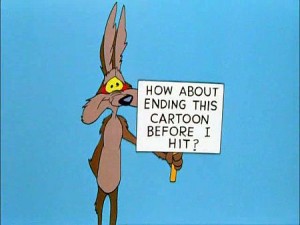 I’ve never had what it is now the custom to call a “bucket list.” I’m pretty sure this is because I’m not one to think in terms of long-range goals. Don’t be bored has always been my Prime Directive, and when you look at life that way, you tend not to plan very far ahead. I don’t know whether that’s a characteristic bias of the journalist, who jumps from story to story, or a point of view more specific to me. Whatever the reason, it’s the way I operate: I take things as they come.
I’ve never had what it is now the custom to call a “bucket list.” I’m pretty sure this is because I’m not one to think in terms of long-range goals. Don’t be bored has always been my Prime Directive, and when you look at life that way, you tend not to plan very far ahead. I don’t know whether that’s a characteristic bias of the journalist, who jumps from story to story, or a point of view more specific to me. Whatever the reason, it’s the way I operate: I take things as they come.